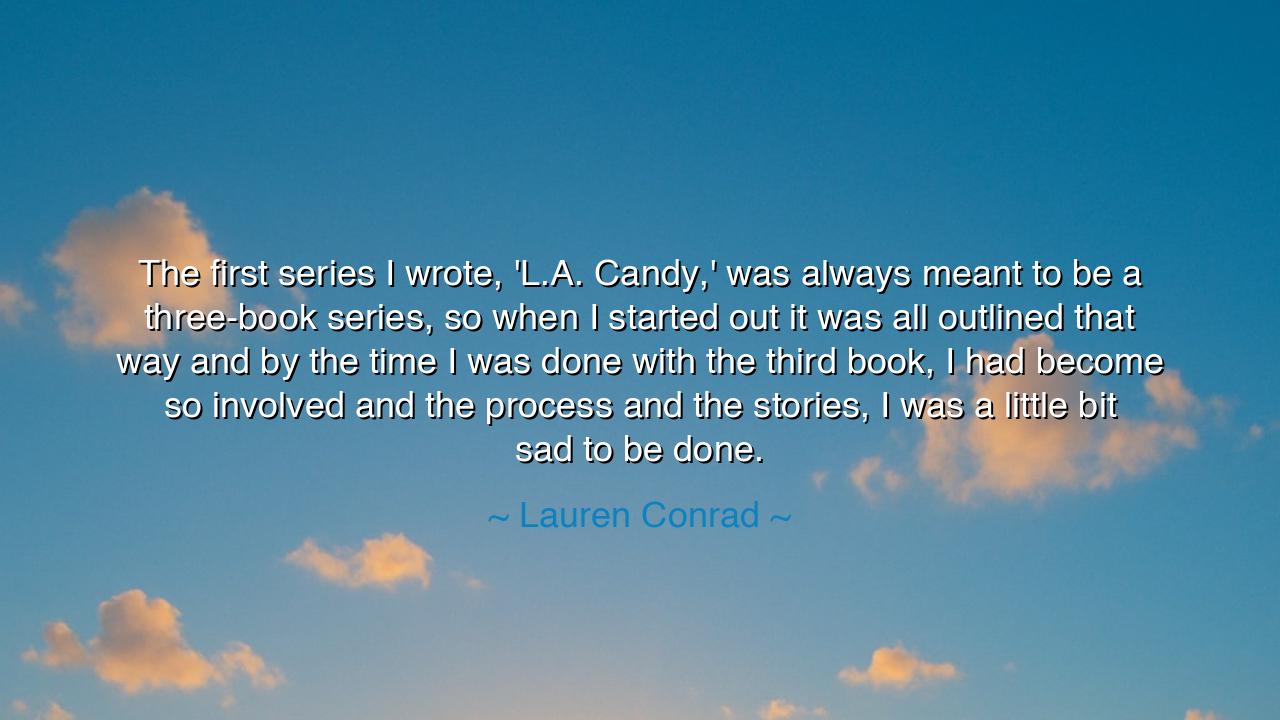
The first series I wrote, 'L.A. Candy,' was always meant to be a
The first series I wrote, 'L.A. Candy,' was always meant to be a three-book series, so when I started out it was all outlined that way and by the time I was done with the third book, I had become so involved and the process and the stories, I was a little bit sad to be done.






Hear the words of Lauren Conrad, spoken with both tenderness and longing: “The first series I wrote, ‘L.A. Candy,’ was always meant to be a three-book series, so when I started out it was all outlined that way and by the time I was done with the third book, I had become so involved in the process and the stories, I was a little bit sad to be done.” In this reflection, we see the paradox of creation: that to finish a work is both triumph and grief, for one has brought something into being, yet must also release it.
The writer’s journey is like the planting of a garden. At first, there is the plan, the structure—the outline of where seeds will fall. Then, through labor, care, and patience, the garden grows. By the time it is in full bloom, the creator is no longer merely an observer but bound to the work, attached to the lives of the characters, the rhythms of the story, the seasons of its growth. To say farewell at the end of a series is not unlike bidding farewell to a home built with one’s own hands. It brings sadness, for the creator has lived within that world, and now must leave it behind.
The ancients knew this sorrow. Homer, in his Odyssey, did not simply tell the tale of Odysseus returning home; he himself lived within that world for decades, weaving each line with the devotion of one who could not easily let go. Likewise, the builders of cathedrals in medieval Europe worked lifetimes on one structure, knowing they would never see its completion, yet still mourning when their own work came to an end. For the act of creation binds the soul to its creation; once the work is done, the silence feels like loss.
Conrad’s words also speak of involvement, the way art pulls its creator into deeper intimacy. At the beginning, the series was an outline, a plan. But by the end, the stories had become alive, infused with her spirit. It is this aliveness that makes the ending bittersweet: the writer has lived with these characters as companions, endured their struggles, celebrated their triumphs, and when the last page is turned, it feels like parting from old friends. The sadness comes because art is not only product—it is relationship.
And yet, in this sorrow lies beauty. For to feel loss at the end of a creation is to know it was deeply loved. A project that ends without attachment was never truly alive. To be sad at completion is to bear witness to the depth of investment, the pouring out of self into something that will endure beyond the creator’s hands. The grief itself becomes a sign of triumph: the work mattered, and it has taken on a life of its own.
The lesson here is timeless: embrace the endings of your endeavors not with despair, but with gratitude. Do not rush to escape the sadness of completion, for it is proof that your work held meaning. When one chapter closes, allow yourself to mourn it, but also recognize that the skills, the wisdom, and the love you gained remain within you. And from that strength, new beginnings will rise.
Thus, Conrad’s words remind us: every act of creation carries within it both joy and farewell. To create is to love, and to finish is to let go. So when your own work reaches its end—whether a book, a project, or even a season of life—do not fear the sadness. It is the mark of deep involvement, of having given yourself fully. Let it teach you to begin again, carrying forward the passion that made the first journey so rich. For though endings bring sorrow, they are also the soil from which new creations spring.






AAdministratorAdministrator
Welcome, honored guests. Please leave a comment, we will respond soon